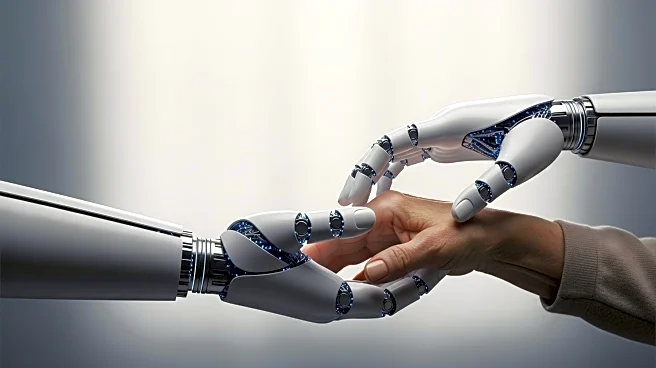What's Happening?
At the Medical Artificial Intelligence Conference in Beijing, the launch of the world's first AI doctor dedicated to geriatrics was announced. Developed by Beijing Geriatric Hospital in collaboration with Shukun Technology, the AI system, known as AI Dr. Xiaoxiang, achieved a 95% diagnostic concordance with senior clinical teams in complex cases. This development represents a significant advancement in integrating AI into healthcare systems, particularly in managing the complexities of geriatric medicine. The AI-enabled hospital system in Beijing is deploying AI across the entire patient journey, from pre-admission triage to post-discharge remote monitoring, demonstrating a comprehensive approach to healthcare innovation.
Why It's Important?
The introduction of AI in geriatric care is crucial as it addresses the challenges posed by ageing populations and medical workforce shortages. By embedding expert clinical reasoning into AI models, the Beijing project showcases how digital systems can extend scarce expertise without compromising quality. This innovation is particularly relevant for countries like the UK, where similar demographic and healthcare system pressures exist. The AI-enabled hospital system offers insights into how AI can support continuity of care across hospital and community settings, potentially transforming healthcare delivery and improving patient outcomes.
What's Next?
The development of AI Dr. Xiaoxiang opens opportunities for international collaboration, particularly between the UK and China. The UK can leverage its strengths in medical research, ethics, and governance to complement China's large-scale AI deployment capabilities. This partnership could lead to shared innovation that enhances healthcare systems globally. As AI continues to evolve, healthcare providers will need to consider how to integrate these technologies effectively to benefit patients and support clinicians while reflecting societal and cultural values.
Beyond the Headlines
The integration of AI into healthcare systems raises ethical and governance questions that need to be addressed. Ensuring that AI technologies are used responsibly and equitably is essential to avoid potential biases and ensure patient trust. Additionally, the long-term implications of AI in healthcare could lead to shifts in workforce dynamics, requiring new skills and training for medical professionals to work alongside AI systems.









